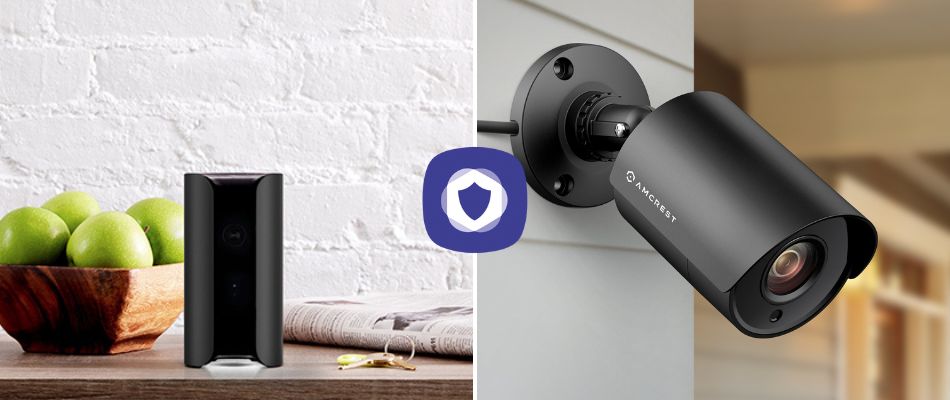If you're upgrading your home security, home security cameras are the best things to purchase. A security system isn't complete without it, and they comprise the eyes and ears of your security system.
Choosing the right cameras can be complex because there are plenty of providers available. Today, we'll be taking a look at Canary and Amcrest. Canary is a simple provider offering low-cost security equipment; Canary launched in 2013 as part of a successful Kickstarter campaign. Amcrest is a modern security provider offering smart home integration and advanced equipment including baby monitors.
Canary vs Amcrest: What do they have in common?
- Video doorbell: Amcrest and Canary offer video doorbells.
- Cloud storage options: Amcrest and Canary rely heavily on cloud storage options.
- Mobile app: Whether you're an iPhone or Android user, you'll be able to monitor your security system via the mobile app, which includes a live feed and push notifications.
- DIY installation: You can save money by installing your system by yourself.
- Two-way talk: You can use two-way audio to talk to visitors and make it seem that you're home - even if you're not.
- Smart home integrations: Both providers offer limited smart home integrations, including Amazon Alexa.
- Pan-tilt zoom: Several camera models offer pan-tilt-zoom features.
- Cameras: You can purchase outdoor and indoor cameras and incorporate them into a home security system.
- Night vision: Most outdoor security cameras are compatible with night vision, including color night vision.
Canary vs Amcrest: What are the differences?
- Motion detection fees: Amcrest charges extra for motion detection.
- Installation complexity: Amcrest has a more complex installation.
- Moneyback guarantee: Canary offers a generous 60-day moneyback guarantee.
- Pricing: Canary is cheaper.
- Resolution: You can purchase 1080p HD resolution cameras from both providers, but only Amcrest offers 4k resolution.
- Security bundle sizes: Amcrest caters to NVR camera bundles, which are much larger and more comprehensive than Canary's.
- Variety of hardware: Canary offers a simplified range with less variety than Amcrest.
- AI technology: Canary offers AI technology with some of its more advanced cameras.
Canary Security: What you need to know
Canary is a home security provider that started with a successful Kickstarter campaign in 2013; it's known for its line of impressive home security cameras with multiple useful features. Canary has excellent features, including some of the best home security cameras, local storage (via a MicroSD card), and compatibility with If This Then That (IFTTT) equipment. Let's break down what Canary can offer you.
Installation
You can install your new system effortlessly; there's no need to drill holes or use ethernet cables. You can set up your security camera system in less than 30 minutes; it's usually a plug-in-and-go experience. If you have any issues, there are multiple troubleshooting options, including a live chat. Wireless cameras are the easiest to install.
Equipment
Canary only offers mounts and cameras at the moment, though some offer built-in extras, including a climate monitor; you can also purchase an air quality monitor. Most companies provide this separately. Canary markets a 'complete security system in one device' camera system, with excellent video quality and other extras:
- Canary Pro
- Canary View
- Canary Flex
Mounts
You'll need to select a mount to install your system; available mounts include:
- Secure mount
- Twist mount
- Stake mount
Home automation
Only basic smart home devices are offered, no smart lights are available, but Z-wave compatibility is offered:
- Amazon Alexa
- Google Assistant
- Wink
- Apple Homekit
You can use the smart security mobile app to watch a live stream of your security system, including motion-activated alerts.
Costs
When you buy your new security system, you'll have plenty of costs to consider, which include:
- Equipment: You'll need to buy your equipment upfront; you can save money if you purchase a subscription. Equipment costs don't exceed $130 per camera.
- Monthly costs: If you only need the fundamentals, you won't need to pay extra. You can subscribe to a premium plan for $9.99 to unlock extra features. Some additional extras are behind a paywall.
Nerd pros
- Money-back guarantee: Canary has a reliable guarantee; you'll be eligible for a refund up to 60-days post-purchase.
- Price: The most expensive Canary camera is the Canary Flex; the Flex is a $129 camera that's weatherproof and suitable for outdoor use. Additional monthly costs can be $9.99 per month. Canary is one of the cheapest providers.
- Unique features: Canary offers great additional features such as climate control, AI technology, and a siren.
Nerd cons
- No door or window sensors: The lack of environmental sensors leaves your home vulnerable; to account for this, you'll need to consider mounting a camera at every entry point.
- No monitoring services: Canary doesn't offer full professional monitoring and only has a panic button.
Amcrest: What you need to know
Amcrest is an excellent camera provider, offering cameras and smart doorbells that can be powered via ethernet and your Wi-Fi network; Amcrest also offers full NVR (Network Video Recorder) systems for larger multi-camera setups. Let's break down what Amcrest offers.
Installation
Since Amcrest offers a lot of different equipment, it's hard to look at Amcrest's installation process. The Wi-Fi cameras are straightforward, plug and play. But the ethernet variations require more drilling. DVR (Digital Video Recorder) and NVR systems can be harder to install, but these systems are DIY only. You’ll need to find your own contractor if you require professional installation.
Equipment
Amcrest offers a variety of cameras that you can incorporate into a security system, including outdoor cameras and indoor baby monitors. The variety includes:
- Motion sensor cameras
- Video doorbells
- Floodlight cams
- Nanny cams
- IP cameras
Amcrest cameras sometimes lack basic features such as two-way audio, but newer models include this. Most Amcrest cameras have wide angles with larger fields of view, and they can be purchased in up to 4k resolution.
Home automation
Amazon Alexa is the only significant automation offered, and there aren't many dedicated smart products offered, including doorbell cameras.
Costs
Amcrest offers a variety of cameras, including baby monitors and nanny cams. Basic home security cameras start from $50-$200, but NVR systems can reach over $3000.
Most domestic users won't spend more than $300, and you can upgrade your monthly package for $6-9, giving you continuous recording, motion-activated clips, and more.
Nerd pros
- Customization: You can edit your camera's frame rate, motion sensitivity, and motion zones from within the app.
- No subscriptions: You can use the system without a subscription; monthly fees aren't required.
Nerd cons
- Limited integration: Amcrest doesn't provide many third-party smart devices, such as thermostats or light bulbs.
- More complex install: Some installations can be difficult, especially wired installations. If you're not great at DIY, you may want your own tradesperson.
- No professional monitoring: You'll need to be comfortable keeping an eye on your system as there is no monitoring beyond basic push notifications.
Canary or Amcrest?
If you're looking for the best home security systems, Amcrest offers superior picture quality and functionality, but the cameras may be more expensive. Canary offers cheaper cameras and better smart home automation, but Amcrest offers dedicated motion sensors. Canary is ideal for those looking for an all-in-one system, but Amcrest can cater to NVR customers wanting a larger home system or a business security system. You can't go wrong with either provider.
This article has been reviewed and approved by Officer Banta.

Officer Banta is the official SecurityNerd home security and safety expert. A member of the Biloxi Police Department for over 24 years, Officer Banta reviews all articles before lending his stamp of approval. Click here for more information on Officer Banta and the rest of our team.

